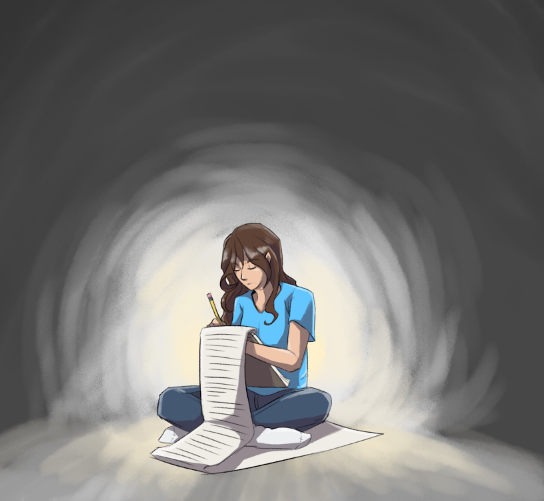Barrett: Self-care in the midst of political tension

Bio: Eva is a third year student, black queer poet and teacher who wants to make the load a little lighter for the next generation of students of color.
Election Night is over. All of our strange election watch parties have died down— many of us may have fallen asleep during the CNN coverage only to wake up at 2 in the morning to find out that yes, Donald Trump was elected to be the next president of the United States.
Even if you don’t consider yourself to be particularly involved in social justice work or politics, it’s still difficult to shake the fact that this election affects everyone. As students, our ability to pay for education is on the line. The past 50 years of policy work is on the line right now in terms of women’s health care, voting rights and community relationships with the police. Furthermore, we are living in a moment that capitalizes on people who are not in tune with their mental and emotional health. Even in the strangest times, being in tune with the deepest parts of ourselves is a healthy strategy for combating institutionalized oppression, and it protects us from internalizing the violence of our bizarre political climate. No matter what side you fall on politically, self-care is a necessity.
So how does a person, in all of this mess, stay mentally and emotionally healthy, especially when finals are approaching? To be frank, I don’t even really know. But here is how, as a student, I am choosing to be okay in the face of this very bleak election turnout.
I woke up this morning and the news was still true. I was unnerved that I didn’t feel anything. Even as I write this, I still feel a little numb. But I rolled out of bed, sat at my desk, and closed my eyes. I listened to the sound of my own breath. My breath is sometimes the only reminder that my life is precious. If you have a moment, I encourage you to take five minutes out of your day today to breathe in for eight seconds, hold for four seconds and then breathe out for eight seconds. It will feel uncomfortable at first, but it forces you to focus intently on your breath, the thing that propels you through your day.
After spending a few minutes with some deep breathing exercises, I sit down for about twenty minutes and write. Sometimes it’s an op-ed piece; sometimes it’s a poem, a short story or a scene for a play. Sometimes it’s just a journal entry. Writing might not be everyone’s forte, but if you find that it helps you sort through the chaos, try doing it for at least 10 minutes every day. You can do it while you’re on the Red Line, the commuter shuttle or waiting for a class to start. Instead of checking Facebook in the morning, try this practice for a couple of days and analyze how it makes you feel.
Also, do not check Facebook. For a little bit. Studies have shown over the past couple of years that constant Facebook usage can lead to either an increase in or development of depression. We already live in bizarre times. Facebook might not be your best companion for navigating that.
Lastly, especially as young people, educators, artists and more, we absolutely must show up for each other. By showing up, I mean checking in frequently with those you care about. Remember that you are not going through this alone.
This also means showing up for yourself. Though we’ve already discussed ways to show up for oneself, we need to remember that we must be gentle with ourselves and to ask for help when we need it. You may feel confused, lost, apathetic, angry or exhausted because of this election, and may not know what questions to ask yourself or others about the madness. Perhaps putting yourself in a safe space on campus will at least provide some level of reassurance that we will move forward from this.
Some places on campus that have proven to be helpful safe spaces in times of crisis include University Counseling Services, the Flora Stone Mather Center for Women, the LGBT Center, the Office of Multicultural Affairs and the Social Justice Institute.
The next couple of months are going to be very difficult, and if we are going to fight this we need to be in it for the long haul. That being said, do remember that you are the center of your own life, and if you find your emotional and mental health being violated, it might be time to take a step back and take stock of what you need to recover. Even if you don’t consider yourself politically engaged, take steps to monitor yourself and engage in radical self care. It’s one of the many steps to moving forward from this strange and dark moment.

